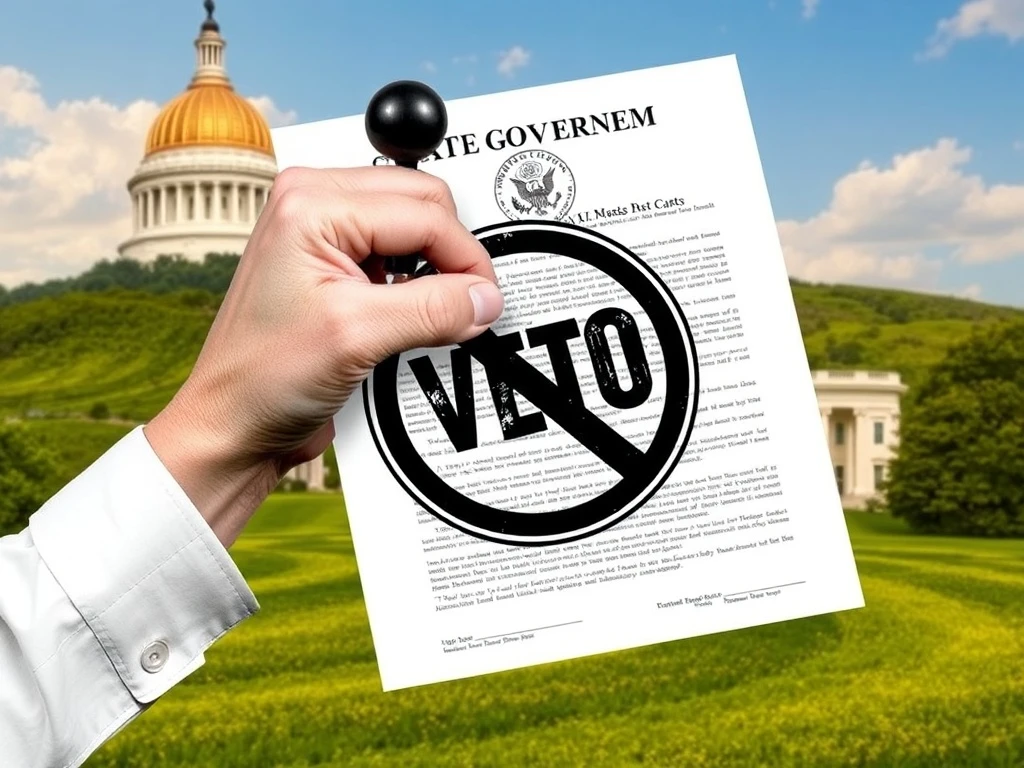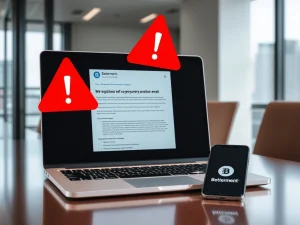Shock Veto: Arizona Governor Rejects Bill to Stockpile Seized Crypto

The world of cryptocurrency regulation saw a significant development recently when Arizona’s governor stepped in to halt a legislative effort. This move impacts how the state handles assets obtained through forfeiture, particularly concerning Arizona crypto.
Why the Arizona Crypto Seizure Bill Was Vetoed
Arizona Governor Katie Hobbs recently vetoed House Bill 2324. This bill aimed to create a specific fund for managing seized crypto assets. According to the governor’s veto letter, her primary concern was that the bill would ‘disincentivize local enforcement from working with the state on digital asset forfeiture by removing seized assets from local jurisdictions.’
Here’s a breakdown of the proposed fund and the governor’s concern:
- The bill would have established a ‘Bitcoin and Digital Assets Reserve Fund’.
- The first $300,000 in a criminal forfeiture would go to the attorney general’s office.
- Amounts exceeding $300,000 would be split: 50% to the AG, 25% to the state general fund, and 25% to the new reserve fund.
- Governor Hobbs believes this distribution model would reduce the incentive for local agencies to cooperate with the state on these cases, as local entities would receive less of the forfeited assets directly.
Legislative Journey and Potential Override
The path of HB 2324 through the Arizona legislature was not straightforward. Initially, the state’s House voted the bill down. However, the Senate revived it through a reconsideration vote. The bill then successfully passed the House in a subsequent vote.
While the Governor Katie Hobbs veto halts the bill for now, it could technically be overridden. This would require a two-thirds vote in both the House and the Senate. However, this outcome appears unlikely unless a significant number of lawmakers change their previous votes.
Governor Hobbs’ Stance on State Crypto Fund Efforts
This is not the first time Governor Katie Hobbs has rejected legislation related to cryptocurrency and state asset management. Her history indicates a cautious approach to integrating digital assets into state finances.
Previous vetoes include:
- Senate Bill 1025 (May): This bill proposed creating an Arizona Strategic Bitcoin Reserve, allowing the state treasurer to invest up to 10% in Bitcoin. Governor Hobbs described cryptocurrencies as ‘untested investments’ when vetoing this measure.
- Senate Bill 1373: Another bill aimed at creating a Strategic Digital Assets Reserve from seized assets, which also faced a gubernatorial veto.
Despite these rejections, one related bill, Arizona House Bill 2749, was enacted in May. This law integrates crypto assets into Arizona’s financial and unclaimed property frameworks and also mentions establishing a Bitcoin and Digital Assets Reserve Fund managed by the state treasurer. The exact relationship between this enacted bill and the vetoed HB 2324 regarding the fund’s purpose (investment vs. seized assets) highlights the complexity of ongoing crypto regulation discussions in the state.
Arizona’s Approach Compared to Other States
Arizona is not alone in considering how states should interact with digital assets. The idea of a state crypto fund, particularly for holding Bitcoin or other digital assets, is gaining traction elsewhere in the US.
- Texas: Governor Greg Abbott signed a bill to create the Texas Strategic Bitcoin Reserve for long-term state assets.
- New Hampshire: Passed legislation allowing the state to ‘invest in cryptocurrency and precious metals’.
Data suggests several other state legislatures are also exploring bills to create similar crypto reserves. These efforts reflect a broader trend of states evaluating the potential roles of digital assets in their financial strategies and asset management.
Conclusion: The Future of Seized Crypto in Arizona
Governor Katie Hobbs’ veto of the bill concerning seized crypto assets underscores the ongoing debate about how states should handle digital assets obtained through law enforcement actions. While the veto prevents the immediate creation of a specific reserve fund for these assets as outlined in HB 2324, the state’s legislative landscape regarding cryptocurrency remains active. With other states moving forward on similar initiatives, Arizona’s approach to crypto regulation and the management of digital assets will continue to be a point of interest for the cryptocurrency community and legal observers alike.










